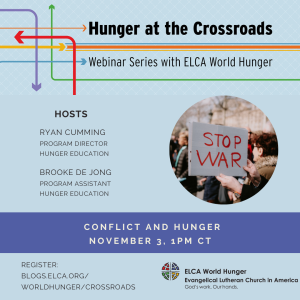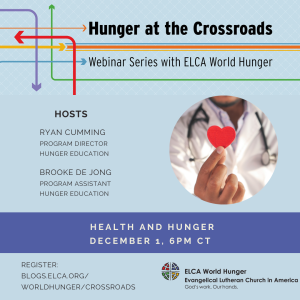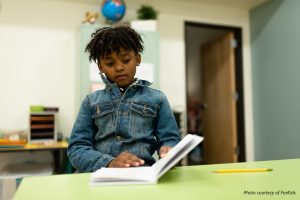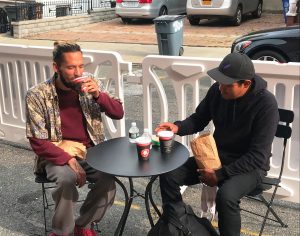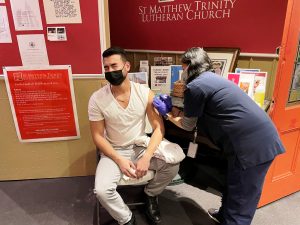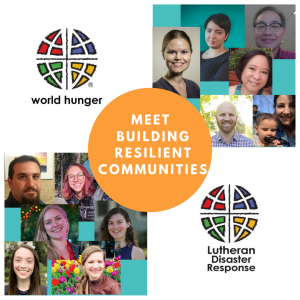
What Is “Building Resilient Communities”?
ELCA World Hunger and Lutheran Disaster Response are ministries deeply rooted in the identity of the ELCA, and the mission to which God calls this Church. Together, for decades, these ministries have accompanied communities where God is at work through congregations, synods, social ministry organizations, companions and other partners building a just world where all are fed and bringing hope, healing and renewal to people whose lives have been disrupted by disasters.
This collaboration arises from what we know about both disasters and hunger. Disasters can exacerbate some of the same vulnerabilities and challenges that ELCA World Hunger seeks to address. By accompanying communities through recovery from a disaster, Lutheran Disaster Response helps reduce these vulnerabilities for the long-term health and stability of communities. And some of the surest steps in reducing vulnerability to the effects of disaster are the very things ELCA World Hunger accompanies our neighbors toward – sustainable food systems, sufficient housing, stable income and accessible health care. Whether we look at best practices for meeting human needs or the faith that calls us to walk with our neighbors toward the bright future God promises, the work of ELCA World Hunger and Lutheran Disaster Response are closely connected.
So, we are happy to share with you that these two ministries are now joined together on a single team within the Service and Justice home area of the ELCA churchwide organization: the Building Resilient Communities Team!
“Building Resilient Communities” expresses the deepest commitments of both ministries, which will remain distinct and yet related in this new configuration. Both Lutheran Disaster Response and ELCA World Hunger support work that meets the immediate needs of our neighbors while also working and walking with congregations, partners and companions toward long-term, transformative change. We know that the work to which God calls our church is the work of ensuring that we and our neighbors can thrive today and tomorrow.
For ELCA World Hunger, this has meant supporting the work of job creation, health care, stable housing, access to clean, safe water and more, as well as the critical work of food pantries and emergency feeding programs. Lutheran Disaster Response helps meet the immediate and long-term needs of communities and supports proactive measures to ensure that the next time a disaster strikes, our neighbors will be better equipped to respond and less vulnerable to the worst effects. That resilience – founded on addressing the roots of injustice that create vulnerability – is key to the work supported by both ministries, and now it is central to who we are as a team together.
The Building Resilient Communities Team (BRC) includes staff responsible for both the domestic and international work of ELCA World Hunger and Lutheran Disaster Response. As one team, BRC brings together both Lutheran Disaster Response and ELCA World Hunger, as well as the domestic and international components of both ministries’ work. And, of course, we continue to work closely with colleagues throughout the churchwide organization, synods, companion churches, congregations and partners.
As we introduce this new structure within the churchwide organization of the ELCA, we are excited to introduce, too, the members of BRC!
Interested in joining the Building Resilient Communities team? The ELCA is hiring! Follow the links to learn more about openings for a domestic grants manager and for a social ministry organization engagement manager.
Rebecca Duerst – Senior Director, BRC
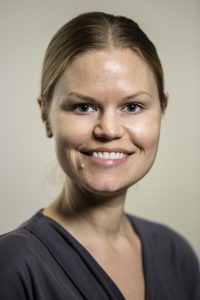
Greetings! My name is Rebecca Duerst, and I am honored to serve as senior director, Building Resilient Communities (BRC) in the Service and Justice Home Area of the churchwide organization of the ELCA. In this role I lead the BRC team, a group of incredible colleagues you will meet here, who together serve as leaders for the programming of ELCA World Hunger and Lutheran Disaster Response both domestically and around the world. I’ve been working with the ELCA for about 10 years, most recently as director for Diakonia and, earlier, as program director for global health in the Global Mission unit, and prior to that, in Global Service with one of the Lutheran churches in Namibia. I’m originally from Wisconsin and grew up in a family of six sisters. I have a strong love of learning and am grateful to have had access to a variety of educational opportunities, including majoring in Art, Biology, and Chemistry at St. Olaf College (Um Yah Yah!), and earning a M.A. in Education, a M.P.H. in Global Health, and a Ph.D. in Molecular Microbiology and Immunology. I’m excited to be taking on this new role leading the BRC team that brings together the domestic and international work of ELCA World Hunger and Lutheran Disaster Response in an integrated way, particularly to explore how we, together with ELCA congregations, synods, social ministry organizations, global companion churches, and Lutheran and ecumenical partners, can more holistically seek to address root causes of oppression and injustice and work toward transformation and liberation.
Katy Ajer – Program Director, World Hunger-International
 Hello! My name is Katy Ajer, and I am the Program Director, World Hunger International. I work on stewarding ELCA World Hunger funds to companion churches and organizations outside of the ELCA in their efforts to improve sustainable development, education, health, and peace, justice, and reconciliation around the world. I also work alongside other churchwide organization staff to facilitate learning events for and by other companions. I am honored to be able to work alongside these passionate and skilled local leaders and to help share their contexts and realities with ELCA members.
Hello! My name is Katy Ajer, and I am the Program Director, World Hunger International. I work on stewarding ELCA World Hunger funds to companion churches and organizations outside of the ELCA in their efforts to improve sustainable development, education, health, and peace, justice, and reconciliation around the world. I also work alongside other churchwide organization staff to facilitate learning events for and by other companions. I am honored to be able to work alongside these passionate and skilled local leaders and to help share their contexts and realities with ELCA members.
I am the daughter of an ELCA pastor and deacon, who carries a strong faith but decided earlier on that I was not a person to work in the church J. Before coming to the ELCA I worked in social services as a case manager in homeless shelters, a health coordinator at an Early Head Start, board member for a free clinic, and a researcher at a hospital, eventually earning a Master of Public Health in Maternal and Child Health. Public Health called to me because of its combination of the biological mechanisms that our physical and mental health reflect and the complex social realities (and inequities) that play such a strong role in the biological response. It allows us to see things at a macro level of the policies or structural inequalities that cause different health outcomes between different groups and at the micro level of an individual. This year, I’m looking forward to learning more about the domestic work of ELCA World Hunger and Lutheran Disaster Response.
Juliana Glassco – Director, ELCA World Hunger-Domestic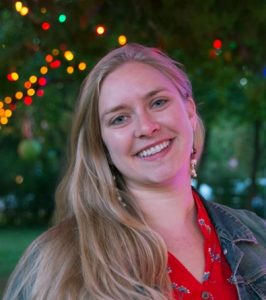
I’m Juliana Glassco, and I am the Director for ELCA World Hunger – Domestic. In this role, I lead the team supporting ELCA World Hunger’s domestic partnerships – a network of individuals, synods, congregations and their partners learning and taking action together toward a just world where all are fed. My passion for building vibrant, healthy communities began with a year of service in Lutheran Volunteer Corps. Since then, I have worked with communities both domestically and internationally to strengthen community identity and engagement through the built and natural environment, interfaith collaboration, and shared ministry toward ending hunger. I started working with ELCA World Hunger in 2018, managing domestic grants. As part of the new Building Resilient Communities team, I’m over the moon about the opportunity to explore relationships and strategies for impact with our international and Lutheran Disaster Response colleagues and partners.
John Pyron – Program Director, Lutheran Disaster Response-US
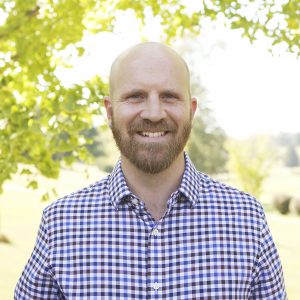 Hello! My name is John Pyron, and I serve as the Program Director for Lutheran Disaster Response-US (LDR-US). LDR-US is a national, interconnected network of Lutheran synods, social service organizations, congregations, and external partners that is responsive to the needs of people and communities impacted by disasters and is proactive in addressing community and household disaster risk and vulnerability. LDR-US recognizes that all disasters are local and builds capacity by accompanying local partners in disaster relief, recovery and resilience efforts. LDR-US engages by convening partners for mutual learning, mentorship and support; educates through online, in-person and experiential learning opportunities; equips with relief, recovery and resilience grants; and empowers by utilizing a model of active accompaniment, providing opportunities for people to live out their faith in meaningful ways.
Hello! My name is John Pyron, and I serve as the Program Director for Lutheran Disaster Response-US (LDR-US). LDR-US is a national, interconnected network of Lutheran synods, social service organizations, congregations, and external partners that is responsive to the needs of people and communities impacted by disasters and is proactive in addressing community and household disaster risk and vulnerability. LDR-US recognizes that all disasters are local and builds capacity by accompanying local partners in disaster relief, recovery and resilience efforts. LDR-US engages by convening partners for mutual learning, mentorship and support; educates through online, in-person and experiential learning opportunities; equips with relief, recovery and resilience grants; and empowers by utilizing a model of active accompaniment, providing opportunities for people to live out their faith in meaningful ways.
I began my journey in disaster work as a volunteer chainsaw and debris removal team leader in Mobile, Alabama after Hurricane Ivan in 2004. Since then, I have served in various roles including construction and volunteer coordination, disaster case management, and long-term recovery group coordination, supporting numerous relief and recovery efforts across the country. Prior to joining the ELCA staff in June 2020, I served with two Lutheran Social Service agencies: Lutheran Family and Children’s Services of Missouri and Lutheran Social Services of Central Ohio. I am an avid guitar player, runner, cyclist and a lover of all things outdoor. My partner, Katie, and I live in Louisville, Kentucky, with our two sons, Henry and William.
Marie Ann Sliwinski – Program Director, Lutheran Disaster Response-International
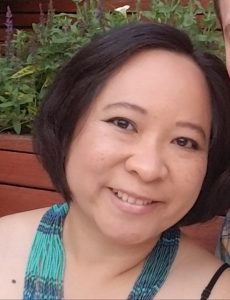 My name is Marie Anne Sliwinski, and I am the Program Director for Lutheran Disaster Response-International at the ELCA. I have been working in the non-profit sector for close to 20 years, 14 of which are dedicated in international humanitarian and development programs. I currently oversee the Lutheran Disaster Response International portfolio, which supports immediate relief and recovery needs of families affected by disasters. I hold a Master’s Degree in International Relations from the University of Chicago. I currently reside in the Chicago suburbs with my husband and two children. This year, I look forward to getting to know the new team and to learn how we can further integrate the work of LDR US and International because as all disasters may be local, the impact is global.
My name is Marie Anne Sliwinski, and I am the Program Director for Lutheran Disaster Response-International at the ELCA. I have been working in the non-profit sector for close to 20 years, 14 of which are dedicated in international humanitarian and development programs. I currently oversee the Lutheran Disaster Response International portfolio, which supports immediate relief and recovery needs of families affected by disasters. I hold a Master’s Degree in International Relations from the University of Chicago. I currently reside in the Chicago suburbs with my husband and two children. This year, I look forward to getting to know the new team and to learn how we can further integrate the work of LDR US and International because as all disasters may be local, the impact is global.
Joseph Chu – Program Manager, Lutheran Disaster Response
I am Joseph Chu, Program Manager of Lutheran Disaster Response (LDR). It is a privilege to serve both LDR International and LDR US under the leadership of Marie Anne and John. In some ways, this new position will help me integrate learnings from my work in both Global Mission and Domestic Mission, two former units within the churchwide organization. Between 2004 and the end of 2009, I was a member of the Asia Pacific Team in Global Mission. And from September 2012 to January 31, 2021, I served on the Lutheran Disaster Response – U.S. team in Domestic Mission.
Meeting with and listening to disaster survivors, participants of community development projects, professional colleagues and volunteers who have given their all for the sake of building a new home, a new community and a more just and equitable community around the world are among the most gratifying experiences I have ever had. In my new role, I will be following up with projects after their respective grant cycle has started. My responsibilities will include monitoring the project, particularly reviewing project reports in collaboration with other team members and my supervisors. I know there are many experts in these areas among our churchwide colleagues, and I look forward to learning from them. In addition to this work, I am an ordained clergy who have served congregations in California and Illinois. I have also worked in the field of non-profit fund development, social work and teaching. My wife and I have a daughter and a son in their early 20s.
Ryan P. Cumming – Program Director, Hunger Education
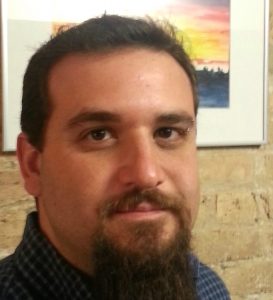 Greetings! I am the program director for hunger education with ELCA World Hunger. In this role, I direct the development of ELCA World Hunger’s educational resources, research trends in hunger and poverty, and help with communications with partners and congregations. In addition to this work with the ELCA, I have served as a consultant and presenter on pedagogy, active learning, and instructional design, and I continue to teach undergraduate courses at both Loyola University Chicago and Central Michigan University. I graduated from Capital University in Ohio before heading over to the Jesuit side of higher ed, earning my MA and Ph.D. in Theology, with a focus on Christian Ethics. When wearing my academic hat, I have presented research on ethics, religion, and neuropsychology at conferences in the United States and abroad and have been fortunate enough to even get published a few times. I am the author of The African American Challenge to Just War Theory (Palgrave, 2013), and contributor to and an editor of the three-volume Forgotten Luther series available from Fortress Press. Before working with ELCA World Hunger, I was interim editor of the Journal of Lutheran Ethics and a member of the ELCA’s task force on criminal justice. Before that, I was a bartender, fishmonger, truck driver, bricklayer and factory worker. Before that… Well, needless to say, I am looking forward to what comes next on the horizon with this great group of colleagues on the Building Resilient Communities team.
Greetings! I am the program director for hunger education with ELCA World Hunger. In this role, I direct the development of ELCA World Hunger’s educational resources, research trends in hunger and poverty, and help with communications with partners and congregations. In addition to this work with the ELCA, I have served as a consultant and presenter on pedagogy, active learning, and instructional design, and I continue to teach undergraduate courses at both Loyola University Chicago and Central Michigan University. I graduated from Capital University in Ohio before heading over to the Jesuit side of higher ed, earning my MA and Ph.D. in Theology, with a focus on Christian Ethics. When wearing my academic hat, I have presented research on ethics, religion, and neuropsychology at conferences in the United States and abroad and have been fortunate enough to even get published a few times. I am the author of The African American Challenge to Just War Theory (Palgrave, 2013), and contributor to and an editor of the three-volume Forgotten Luther series available from Fortress Press. Before working with ELCA World Hunger, I was interim editor of the Journal of Lutheran Ethics and a member of the ELCA’s task force on criminal justice. Before that, I was a bartender, fishmonger, truck driver, bricklayer and factory worker. Before that… Well, needless to say, I am looking forward to what comes next on the horizon with this great group of colleagues on the Building Resilient Communities team.
Brooke De Jong – Program Assistant, Hunger Education
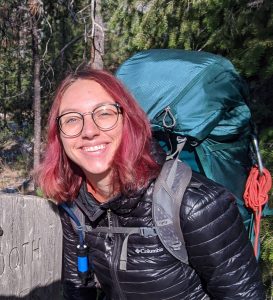 I am Brooke De Jong, and I serve ELCA World Hunger as the Program Assistant for Hunger Education. I have a passion for faith formation that is culturally sensitive, socially responsive and aimed at creating lifelong, engaged faith leaders. I work with the ELCA World Hunger team to create resources that foster faith that is active in love and seeks justice. I am looking forward to deeper collaboration with my colleagues to see what new and innovative resources we can create for the network.
I am Brooke De Jong, and I serve ELCA World Hunger as the Program Assistant for Hunger Education. I have a passion for faith formation that is culturally sensitive, socially responsive and aimed at creating lifelong, engaged faith leaders. I work with the ELCA World Hunger team to create resources that foster faith that is active in love and seeks justice. I am looking forward to deeper collaboration with my colleagues to see what new and innovative resources we can create for the network.
Previous to my work with ELCA World Hunger, I worked on the observance of the 500th anniversary of the Reformation for the ELCA, served as a youth director and served as a HUD grants administrator. I have a Bachelor of Arts in Religion and German with a minor in Ancient Languages from Augustana University in Sioux Falls, S.D. I am currently working on my Master of Divinity and in the process of becoming a deacon in the ELCA. When I am not in the office, I can often be found powerlifting, hiking, backpacking or biking. My last hiking trip was to the Superstition Wilderness in Arizona. My last backpacking trip was an 80-mile loop in the Sawtooth Mountains (see photo).
Angela Galbraith – Grants and Reporting Coordinator
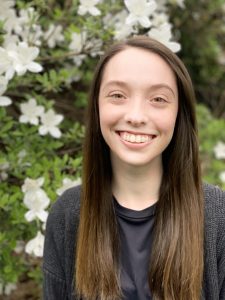 My name is Angela Galbraith, and I am the Grants and Reporting Coordinator for Building Resilient Communities. I am from Pittsburgh, Pennsylvania, but I’m excited to call Chicago home soon. I have a Bachelor of Arts in International Studies with minors in Music, German, and Justice, Law & Public Policy from Wittenberg University in Springfield, Ohio. I have over five years of experience in nonprofit leadership focused on food insecurity and chronic malnutrition. Most recently, I served in the Peace Corps as an HIV/AIDS and Adolescent Health Educator in Lesotho. As Coordinator, I will continue supporting our partners in ministry through the granting process and assist the team in data management and comprehensive impact reporting. I am looking forward to growing both personally and professionally as I learn more about Lutheran Disaster Response and World Hunger-International.
My name is Angela Galbraith, and I am the Grants and Reporting Coordinator for Building Resilient Communities. I am from Pittsburgh, Pennsylvania, but I’m excited to call Chicago home soon. I have a Bachelor of Arts in International Studies with minors in Music, German, and Justice, Law & Public Policy from Wittenberg University in Springfield, Ohio. I have over five years of experience in nonprofit leadership focused on food insecurity and chronic malnutrition. Most recently, I served in the Peace Corps as an HIV/AIDS and Adolescent Health Educator in Lesotho. As Coordinator, I will continue supporting our partners in ministry through the granting process and assist the team in data management and comprehensive impact reporting. I am looking forward to growing both personally and professionally as I learn more about Lutheran Disaster Response and World Hunger-International.
Christine Moolo – Manager, ELCA World Hunger
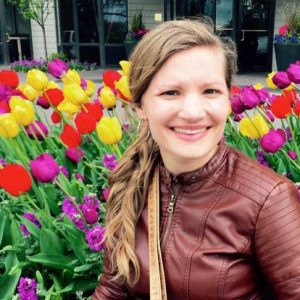 Hi! My name is Christine Moolo, and I serve as the Manager for ELCA World Hunger. In this role, I have the opportunity to engage with the grant processes for both our domestic and international work, support companions and partners in their engagement with our ELCA Grantmaker system, and communicate stories and learnings of ELCA World Hunger-supported ministries to the broader ELCA community. My background is in International Development, and I have served in Kenya, Democratic Republic of Congo, the United States and other locations to promote the work of global and domestic partners in sustainable development and disaster response initiatives. I have been active in racial equity trainings and am an Intercultural Development Inventory Qualified Assessor. I am passionate about partners in sustainable development having the resources they need to adequately take on the systemic and social barriers that prevent their communities from thriving. I live in the Chicagoland area, and I am honored to work alongside my talented, extremely hard-working and passionate Service and Justice colleagues.
Hi! My name is Christine Moolo, and I serve as the Manager for ELCA World Hunger. In this role, I have the opportunity to engage with the grant processes for both our domestic and international work, support companions and partners in their engagement with our ELCA Grantmaker system, and communicate stories and learnings of ELCA World Hunger-supported ministries to the broader ELCA community. My background is in International Development, and I have served in Kenya, Democratic Republic of Congo, the United States and other locations to promote the work of global and domestic partners in sustainable development and disaster response initiatives. I have been active in racial equity trainings and am an Intercultural Development Inventory Qualified Assessor. I am passionate about partners in sustainable development having the resources they need to adequately take on the systemic and social barriers that prevent their communities from thriving. I live in the Chicagoland area, and I am honored to work alongside my talented, extremely hard-working and passionate Service and Justice colleagues.
Petra Rickertsen – Networks Manager, Building Resilient Communities
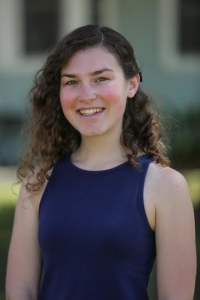 I serve as Networks Manager with the Building Resilient Communities team, supporting both the Hunger Leader and Lutheran Disaster Response networks. My passion for working toward a just world where all are fed began as a camp counselor and grew as a Hunger Leader on the Southwest California Synod Hunger team. I am elated everyday in this role to learn how leaders across both networks creatively build relationships with our global neighbors in addressing hunger and its root causes and disasters and preparedness and support them in achieving their courageous solutions. Though hesitant to trade the roar of the ocean, desert four-wheeling and rock-climbing adventures for snow, I am enjoying the new adventures that Midwest seasons offer.
I serve as Networks Manager with the Building Resilient Communities team, supporting both the Hunger Leader and Lutheran Disaster Response networks. My passion for working toward a just world where all are fed began as a camp counselor and grew as a Hunger Leader on the Southwest California Synod Hunger team. I am elated everyday in this role to learn how leaders across both networks creatively build relationships with our global neighbors in addressing hunger and its root causes and disasters and preparedness and support them in achieving their courageous solutions. Though hesitant to trade the roar of the ocean, desert four-wheeling and rock-climbing adventures for snow, I am enjoying the new adventures that Midwest seasons offer.
Roselle Tenorio – Domestic Grants Manager
 Hi everyone, my name is Roselle Tenorio, and I am joining ELCA World Hunger as the Domestic Grants Manager. Previously, I was the Grants and Programs Manager at Texas Women’s Foundation. I have a Bachelor of Arts in Sociology and Gender, Women’s, and Sexuality Studies from Grinnell College. I have a long and varied relationship with food justice and its intersections, starting at a young age volunteering with my family and community in Dallas, Texas, to researching food pantry systems while in college. I chose the nonprofit career field after a rewarding experience writing a grant for a new mobile food pantry program in rural Iowa. After graduating college, I joined AmeriCorps VISTA and served in Savannah, Georgia, at a nonprofit working on poverty alleviation. Currently, I serve on the board of Abide Women’s Health Services, a grassroots, Black-led nonprofit organization that improves birth outcomes in communities with the lowest quality of care. I also volunteer on the Board of the Hispanic Women’s Network of Texas, Junior Players Young Professionals Committee as a Junior League Dallas Member and as a Community Centric Fundraising (CCF) Texas Organizer. Outside of working and volunteering, in my free time, I can be found wandering the arboretum or an art gallery, hiking and enjoying the outdoors, scoping out delicious local vegan cuisine, or curling up with a new book. I am a seventh generation Tejana, currently living in Dallas with my partner, Devin, who is from Chicago, and our cat, Xochitl. I am honored to be a part of this community and look forward to creating a just world where all are fed.
Hi everyone, my name is Roselle Tenorio, and I am joining ELCA World Hunger as the Domestic Grants Manager. Previously, I was the Grants and Programs Manager at Texas Women’s Foundation. I have a Bachelor of Arts in Sociology and Gender, Women’s, and Sexuality Studies from Grinnell College. I have a long and varied relationship with food justice and its intersections, starting at a young age volunteering with my family and community in Dallas, Texas, to researching food pantry systems while in college. I chose the nonprofit career field after a rewarding experience writing a grant for a new mobile food pantry program in rural Iowa. After graduating college, I joined AmeriCorps VISTA and served in Savannah, Georgia, at a nonprofit working on poverty alleviation. Currently, I serve on the board of Abide Women’s Health Services, a grassroots, Black-led nonprofit organization that improves birth outcomes in communities with the lowest quality of care. I also volunteer on the Board of the Hispanic Women’s Network of Texas, Junior Players Young Professionals Committee as a Junior League Dallas Member and as a Community Centric Fundraising (CCF) Texas Organizer. Outside of working and volunteering, in my free time, I can be found wandering the arboretum or an art gallery, hiking and enjoying the outdoors, scoping out delicious local vegan cuisine, or curling up with a new book. I am a seventh generation Tejana, currently living in Dallas with my partner, Devin, who is from Chicago, and our cat, Xochitl. I am honored to be a part of this community and look forward to creating a just world where all are fed.



